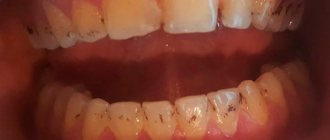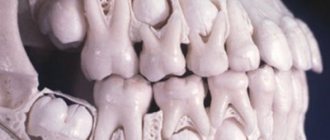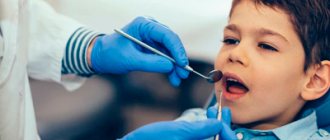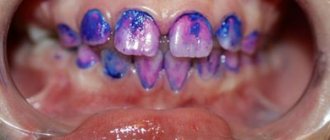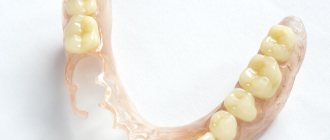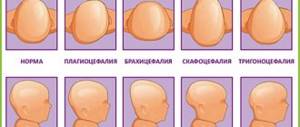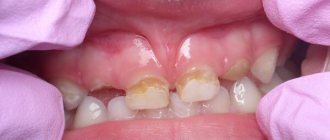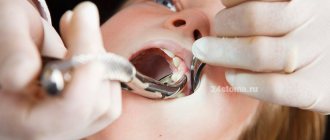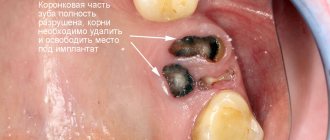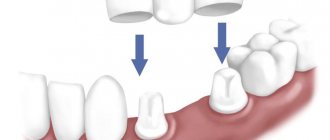Causes of caries development in young children
There are two reasons contributing to the development of caries:
- plaque;
- frequent consumption of sugar (sucrose, glucose in combination with fructose, is especially dangerous).
Often children do not like to brush their teeth or do it incorrectly. As a result, plaque is deposited in areas of the teeth that do not clean themselves when chewing (in fissures, near the gums). Demineralization and softening of the enamel occurs, and subsequently caries.
Young children mainly eat liquid or pureed foods. Active chewing does not occur, and tooth surfaces are not cleaned.
In children, enamel and dentin have a structure that is unusual for adults: mineralization in the tissues is imperfect, teeth are in the process of development. Due to the low density of enamel and its insufficient mineralization, caries in young children develops frequently and is quite severe. A large number of teeth are involved in the process, and circular caries occurs - when the lesion spreads around the neck of the tooth, peeling off the crown from it.
Lack of vitamins, chronic and hereditary diseases also provoke caries in children.
Stages of pathology development
Such destructive processes, affecting children's enamel, develop in stages:
- At first, accumulations of dirt are visible on the enamel, yellowish spots gradually appear on the front teeth, and over time they begin to darken. There is an unpleasant odor from the mouth, which signals the beginning of putrefactive processes,
- the child’s enamel sensitivity to hot and cold food and drinks increases, distinct foci of destruction appear in the form of black spots,
- rotting penetrates into the deeper layers, causing severe pain, which is especially acute under mechanical influence, for example, when pressing,
- the lesion reaches the nerve endings, and the pain subsides. Don't hope that everything will work out. Pathological processes continue to develop, spreading to the root, as a result of which it can be completely lost.
If the problem is not solved in time, the child may lose teeth.
It is important to understand that at the initial stage it is quite possible to solve the problem. But if you delay treatment, you can easily miss the opportunity to save the tooth.
Why should caries in primary teeth be treated?
It is a mistake to think that baby teeth do not require treatment. Tooth decay is a disease caused by the growth of bacteria in the mouth. It weakens the immune system, and this leads to frequent illnesses in the child.
Tooth irritation from food forces the child to spare the affected side when chewing, which can disrupt the bite for life.
Consequences of refusing treatment:
- Maintaining a focus of chronic infection. From the oral cavity, bacteria can spread to the ENT organs, the digestive tract, the lungs and even lead to sepsis.
- Violation of the formation of permanent teeth. Unrecognized deep caries has a negative effect on the rudiments of permanent teeth. As a result, they grow up weakened or already affected by caries.
- Violation of the integrity of the dentition. In the absence of timely treatment, children quickly develop pulpitis. Such teeth are removed, the integrity of the dentition is damaged, and the bite changes.
Degrees of tooth abrasion
- Stage I – the enamel of the cutting edges of the child’s incisors and canines and the upper part of the chewing cusps and molars is erased, the dentin is partially affected.
- Stage II – severe abrasion of the chewing tubercles with exposure of dentin tissue.
- Stage III – the height of the tooth crown is reduced to 2/3 of the normal size during wear.
- Stage IV – abrasion of the tooth to the level of the neck. The crown of the tooth is almost completely erased.
If 1 – 2 teeth of a child are worn out, then this is local abrasion; if several teeth or the entire dentition are affected, then this is generalized abrasion.
How is baby teeth treated?
Treatment of caries in children is carried out only by a pediatric dentist, since the structure of a child’s teeth differs from that of an adult. The doctor must provide psychological comfort for the little patient, otherwise the next visit will be problematic.
The treatment technique has some differences:
- superficial caries can be treated using the silvering method or the application of special remineralizing and fluoridating pastes without the use of a drill;
- when treating moderate caries, special materials and fillings that are safe for children are used; with deep caries and the development of pulpitis, tooth extraction is often resorted to.
What to do if your child's teeth are worn out
Treatment for tooth wear is developed individually. At the appointment, the pediatric dentist analyzes the causes of the pathology, determines the stage of erasure, the nature of the disease and the characteristics of the development of the child’s body.
Prevention of caries in children
- Oral hygiene. From the moment the first tooth erupts, the mother should use a soft cloth wrapped around her finger to clean it of plaque every day. When the oral cavity is filled with teeth, the child can do this on his own with a brush. From 3-4 years old, the use of children's pastes (gel-based) is allowed. It is important to teach your child to brush their teeth twice a day, explaining that it is correct to make vertical movements with the brush, not horizontal ones.
- Diet with restriction of sweet foods. It is important to ensure a complete diet, a sufficient amount of microelements and vitamins in food.
- Use fluoride-containing toothpastes as recommended by your dentist.
- Visit the dentist at least once every six months.
Children cannot explain in time sensitivity to cold and hot in the early stages of caries. They begin to realize the situation when its symptoms become severe pain, but, unfortunately, it is too late.
Young children cannot maintain oral hygiene as well as teenagers. The ability of children, their interest and the attitude of parents form the habit of brushing their teeth.
Often mothers make the mistake of giving their children a pacifier coated with jam, sand or jam, or sweet milk or fruit juice between bedtimes, thereby teaching the children. Such an unbalanced diet leads to the formation of caries.
Is it possible to prevent caries? No medicine or vaccine has yet been invented to completely prevent tooth decay. But, to reduce the formation of rotten teeth, some means are currently used, one of them is “fissure coating”. Tooth decay usually forms in depressions called fissures on the chewing surfaces of the incisors and small incisors. By means of this product, the surface of the channels is closed, thereby preventing food debris and germs from entering the area. This operation can be performed on permanent incisors and small incisors that emerge from the age of 6 years. Another way to prevent tooth decay is to increase your resistance to it. Resistance increases when fluoride is applied to the surface of the teeth.
Should caries be treated in primary teeth? If left untreated, tooth decay in primary teeth can lead to pain, bad breath, difficulty biting, eating disorders and an unsightly appearance. Teeth that are not treated during this period of time can cause crooked teeth, problems in jaw development and general health problems (from rheumatism to heart failure). Therefore, caries of baby teeth should be treated without saying “nothing, new ones will grow in their place.”
Decay in primary teeth can introduce a child to pain from an early age and cause some fears in the future. In addition, caries can cause premature loss of primary teeth.
Tooth wounds in children If a tooth is damaged in children, it is necessary to provide assistance without wasting time. Establishing the correct diagnosis is very important. Therefore, the doctor will ask you for details such as the time and place of the incident, whether there was loss of consciousness, memory loss or vomiting after the blow, from which side the blow was struck. Based on the information received, the correct treatment can be formulated. Dental injuries can sometimes result in a tooth falling out of its socket. In such a situation, you should immediately go to the doctor and take the fallen one. The tooth should be kept in a glass of milk or clean water.
Caring for your baby's oral cavity Feeding your baby in the first 4 months will ensure normal development of the soft tissue around the mouth and muscle function. If the quality of milk is unsatisfactory, then you need to use a pacifier with a physiological tip. (cut end.) Starting from the 1st year, children should learn to eat with a spoon. Pacifier feeding can continue for a maximum of 2 years. The habit of sucking a finger as an imaginary pacifier is allowed up to 2-2.5 years. If there is a habit of thumb sucking, then you need to find out the reason for its occurrence and eliminate it in the period from 3 to 6 years. It can negatively affect breathing and jaw development. If a child breathes only through his mouth (this is more noticeable during sleep), then you should definitely contact an ENT specialist.
WHEN SHOULD CHILDREN START BRUSHING THEIR TEETH? You need to start brushing your teeth when your child is already 6-8 months old (as soon as the first teeth are visible in the mouth). It is recommended to brush (at least the surface of the teeth) with gauze soaked in water after breakfast and before bed. It will be advisable to start using a brush after the back teeth come out (2.5-3 years). It is very difficult to use any one method of brushing teeth in preschool children. At this age, it is very important that your child gets into the habit of brushing his teeth. When brushing their teeth, children usually brush only the teeth that are visible. To avoid tooth decay, children must brush between their teeth and the chewing surfaces of their teeth, so parental supervision after brushing is necessary.
Which brush should you choose for children? The brush should be selected according to the size of the mouth and should consist of soft and nylon bristles. Hard brushes are not suitable for use because they corrode the surface of the teeth. Just as it is impossible to sweep with an old broom, it is also impossible to brush your teeth with an old brush. Regardless of whether the bristles are frayed or not, the brush must be changed after 6 months. HOW MANY TIMES A DAY SHOULD A CHILD'S TEETH BE BRUSHED? It is enough to brush your teeth after breakfast and before bed for 3 minutes. Like any good habit, the habit of brushing your teeth should begin in childhood.
SOME PROBLEMS OF PUMPTS AND ORAL FOLDINGS IN CHILDREN
Baring teeth:
Causes Baring teeth is more common in children whose parents bare their teeth or children who are prone to stress, aggressiveness, complexes and shyness. Signs: Teeth wear, teeth grinding sounds during sleep, pain in the facial muscles, jaw joint problems, headache, loose teeth and sensitivity.. Treatment First, you must try to eliminate the factors that caused it from a psychological point of view. If this method does not work, then you should make a protective agent for one night.
Thumb Sucking: Causes: Thumb sucking is a common bad habit from childhood. It should usually go away on its own by age 4. Continuing this habit even while permanent teeth are growing can lead to structural damage to the teeth and gums. The cause of these disorders is finger pressure on the front teeth and gums. The degree of violation is determined by the duration of sucking, frequency, strength and location of the finger during sucking. Treatment: The most effective way to prevent thumb sucking is to get your baby used to the pacifier. The harm from the pacifier is much less and it is also easier to wean off of it. Timely treatment is very important. The success of treatment is impossible without the desire of the child himself to get rid of this habit. It is recommended to force your child to quit this habit before he goes to school to avoid ridicule and psychological pressure. The child should be encouraged and encouraged without being under pressure. If the child has not gotten rid of this habit before the age of 6, then you should consult a dentist for professional help.
PACIFIER
The pacifier is the most natural way to calm down. If a child shows an inclination towards the habit of thumb sucking, then you should immediately begin to accustom him to the pacifier. Compared to thumb sucking, pacifiers are less harmful and easier to wean off. The pacifier should not be given throughout the day, but only when necessary. If possible, you should choose nipples that are similar in shape to the mother's breast to avoid later structural complications. Every day it is necessary to observe the firmness of the nipple. The size of the nipple should be suitable for the shape of the mouth.
My child's teeth rotted as soon as they appeared. What could be causing this? The child experiences the appearance of brown spots on the teeth and loss of these teeth. In fact, it is tooth decay that causes rotted teeth to fall off. The reason for the formation of caries at such an early stage is the appearance of caries called nipple caries. The main food for the baby is mother's milk and cow's milk contains sugar. By drinking mother's milk or drinking milk through a nipple before or during sleep, milk collects in the mouth, thereby creating a favorable environment for microbes. Therefore, you need to pay great attention to brushing your teeth after eating at night.
What should you do to protect yourself from pacifier caries? Due to the complex treatment of caries in children, it is necessary to take protective measures in a timely manner. What are they?
— Prevent your baby from getting into the habit of sleeping with a pacifier at night. — Try to put the child to bed after eating. — Do not add milk, sugar, honey, doshab and other sweet additives. — Give your baby water to drink after feeding.
When the first teeth appear, brush your teeth with a moistened bandage after morning and evening feedings.
Is nipple caries dangerous? Teeth susceptible to caries and nipples can cause pain and inflammation if left untreated. Inflamed and diseased teeth can cause anxiety and disrupt the child’s diet. Inflammation affects the permanent teeth and can lead to their deformation. If there is a need to remove these teeth, speech problems may arise.
My baby's teeth have rotted without using a pacifier. What could be the reason for this? The next cause of caries is the use of a pacifier dipped in honey, doshab, in order to calm a crying child. To calm the child. In addition, sweet foods containing carbohydrates can also cause caries. Instead of sugary foods, it will be much healthier to feed your child nutritious foods that help clean teeth, such as apples, carrots, etc.
Which paste should be used and for what period of time? It is not recommended to use toothpaste for children during infancy and under 3 years of age. The use of toothpaste should begin at the age of 3. But for brushing teeth, a pea-sized amount of toothpaste will be enough, which is not what is shown in advertising. When you first start using toothpaste, you can use fluoride toothpaste. The most important thing is that the child likes the taste of the paste. We must not forget that the most important thing is not the toothpaste, but the process of brushing your teeth.
Critical Conditions of Children's Teeth Toothache: Brush the area around the sore tooth. Do a salt rinse with warm water and remove any leftover food with dental floss. Never place aspirin or similar medications on your tooth. Give your child the painkiller you have already tested and take him to the doctor. Bitten lip, tongue, or cheek: Apply ice to the wound. If there is bleeding, apply light pressure with a bandage. If the bleeding does not stop after 15 minutes, consult a doctor. If a tooth falls: Find the tooth. Take it, touching the root as little as possible. The ideal environment for storing the tooth until you visit the doctor is milk. Put the tooth in milk and go to the doctor as soon as possible. Damage to primary or permanent teeth: Without wasting time, consult a doctor. Every hour that passes after the damage will work against you. Before you see a doctor: Wash the wound with warm water. Apply a cold compress to the area. Save the tooth fragment if you have it.
